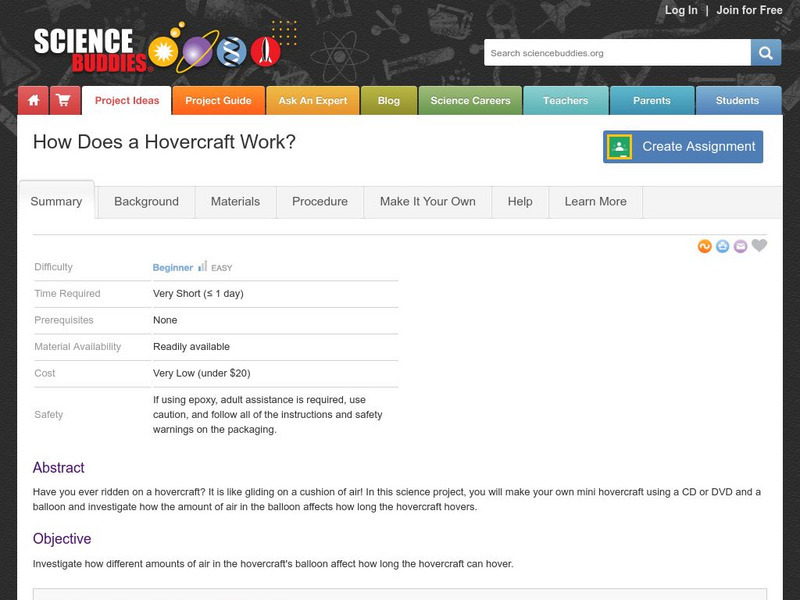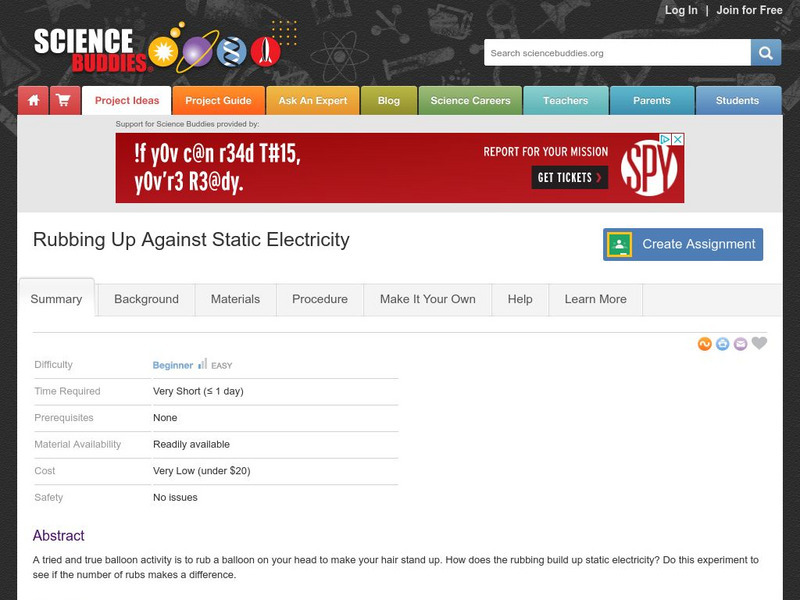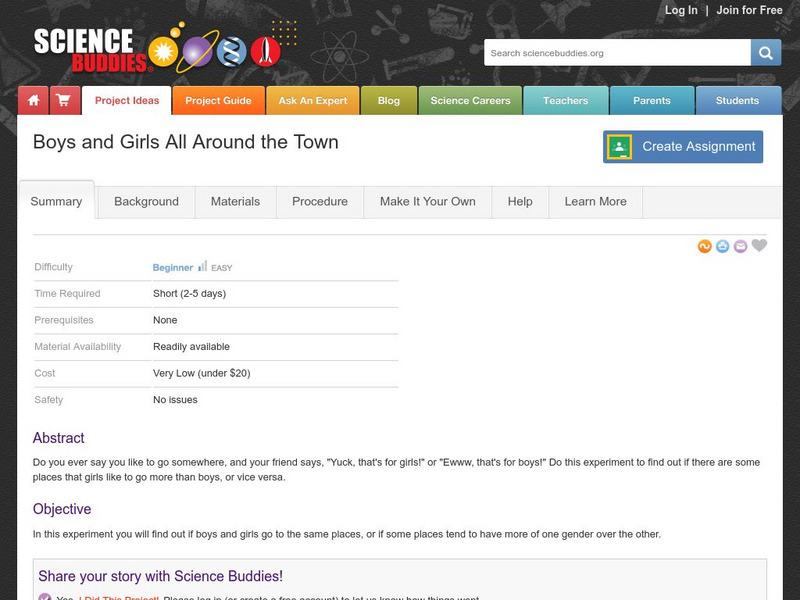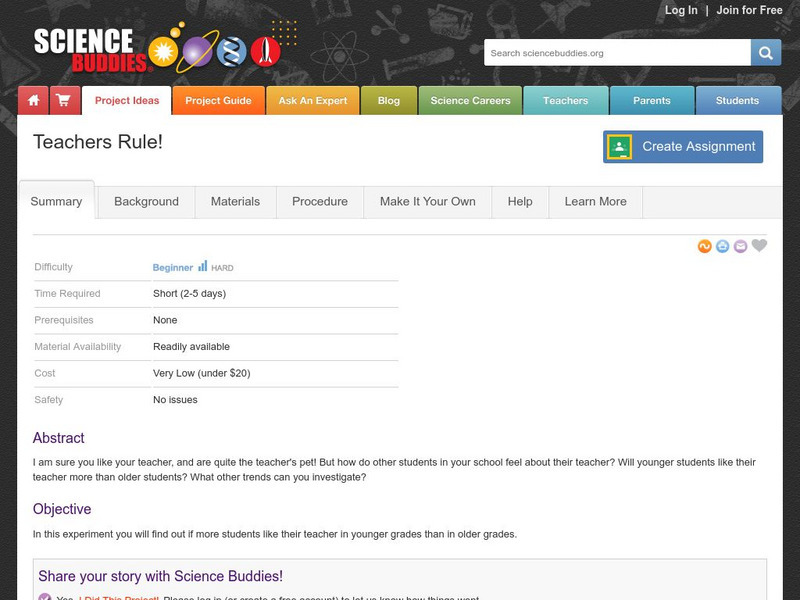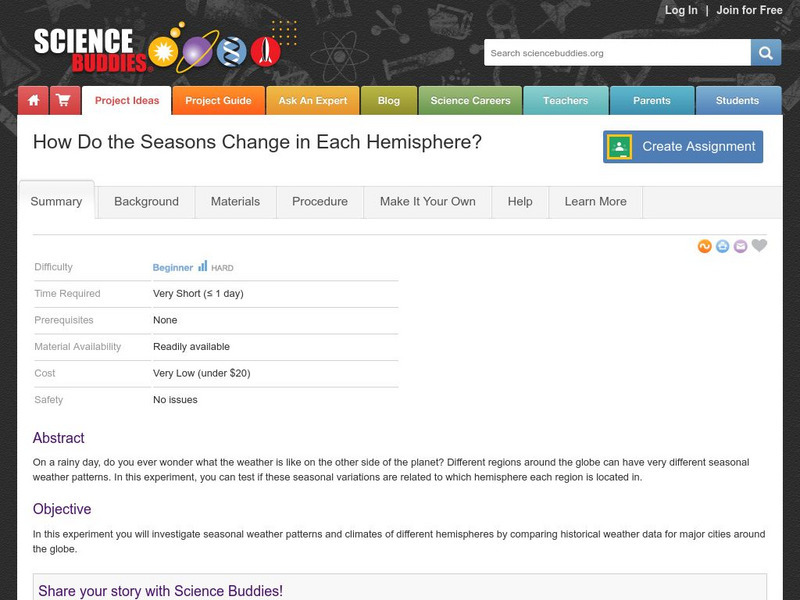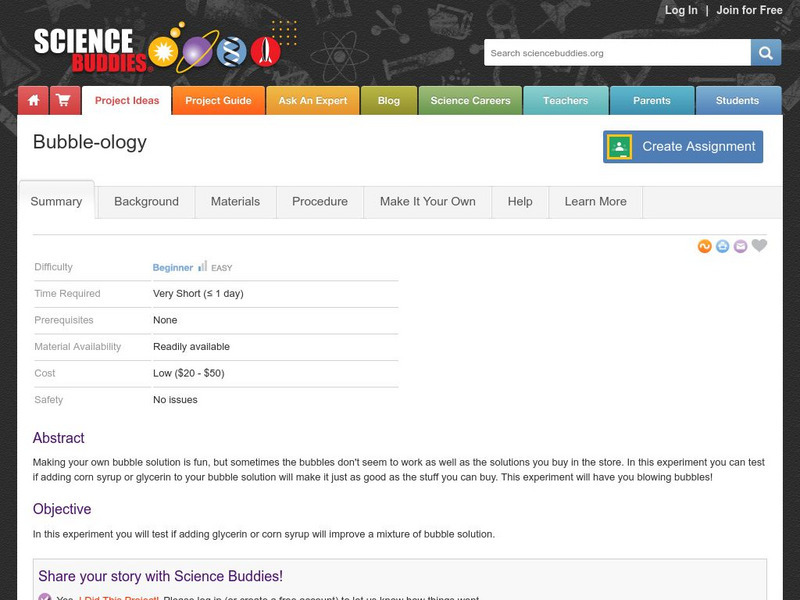Hi, what do you want to do?
Science Buddies
Science Buddies: How Does a Hovercraft Work?
Riding on a hovercraft is like gliding on a cushion of air. Make your own mini hovercraft in this experiment to test how hovercrafts work.
Science Buddies
Science Buddies: Rubbing Up Against Static Electricity
A tried and true balloon activity is to rub a balloon on your head to make your hair stand up. Learn how the rubbing builds up static electricity using this experiment to see if the number of rubs makes a difference.
Science Buddies
Science Buddies: How Do Different Materials React to Static Electricity?
Polyester clothing was generally accepted as a popular trend in fashion at one point in history. Now everybody wears cotton, which doesn't get static cling nearly as much. Why are some materials more susceptible to static cling than...
Science Buddies
Science Buddies: Soil Compaction
Have you ever had to dig a hole in really hard dirt? It is a lot of work. In this experiment you can make an instrument to test the soil and find out how compacted it is, before you dig.
Science Buddies
Science Buddies: Soil Color and Moisture
When you step in mud it can be very messy. How can you tell if soil is wet or dry before you step in it? In this experiment, you can see if color can help you figure it out.
Science Buddies
Science Buddies: Porosity and Particle Size
Often, when we think of something that is solid we think about rocks. But in reality, rocks have tiny holes of air inside them. This is called porosity. In this experiment you can find out what it means to be "solid as a rock."
Science Buddies
Science Buddies: The Golden Rules of Photography
What is it that famous photographers do to make their images so pleasing to the eye? Find out if simple rules of geometry and symmetry can make you a better photographer.
Science Buddies
Science Buddies: Can the Color of Your House Reduce Your Energy Bill?
Did you know that the color of your house could save money? Do this experiment to see which colors regulate temperature best in different environments. Learn how painting the house can save money on the energy bill.
Science Buddies
Science Buddies: Yeasty Beasties
While looking at a package of dry yeast it is hard to believe it is alive. But add the right ingredients and presto, the mixture becomes a bubbly, oozing, mess of life. What are the right ingredients? Do this experiment and figure it out...
Science Buddies
Science Buddies: Boys and Girls All Around the Town
In this experiment you will find out if boys and girls go to the same places, or if some places tend to have more of one gender over the other.
Science Buddies
Science Buddies: Do the Eyes Have It?
Some people have a photographic memory and can memorize anything they see almost instantly. Other people can remember almost anything they hear. Try this experiment to see which type of memory you have.
Science Buddies
Science Buddies: Teachers Rule!
Most students like their teachers. However, they may not always say so. Peer pressure may keep a student from expressing how they really feel. In this experiment you will find out if more students like their teacher in younger grades...
Science Buddies
Science Buddies: How Do the Seasons Change in Each Hemisphere?
On a rainy day, do you ever wonder what the weather is like on the other side of the planet? Different regions around the globe can have very different seasonal weather patterns. In this experiment, you can test if these seasonal...
Science Buddies
Science Buddies: How Does a Wind Meter Work?
On a windy day it is hard to keep your hat on. The power of the wind can even be strong enough to power large wind turbines to make electricity. In this experiment, find out how you can make your own instrument to measure the speed and...
Science Buddies
Science Buddies: How Many Numbers Can You Remember?
Most people don't even remember phone numbers anymore, and instead program them into their phones. There is a limit to the number of numbers, or digits, that most people can remember. Try this experiment to test your digit span, the...
Science Buddies
Science Buddies: Make Your Own Psychrometer
From the name, you might guess that a psychrometer is an instrument designed to measure your thoughts. Actually, it is an instrument that can help you forecast the weather. Read more to find out how it works.
Science Buddies
Science Buddies: Gears Go Round!
Music boxes, bicycles, and clocks all have one thing in common: GEARS. You might say that gears make the world turn, since they are in so many mechanical instruments. How do they work and how do you know which gears to use? Find out in...
Science Buddies
Science Buddies: Rubber Bands for Energy
If you've ever been shot with a rubber band then you know it has energy in it, enough energy to smack you in the arm and cause a sting. How can the energy of a rubber band be put to work? In this experiment you will find out how the...
Science Buddies
Science Buddies: Which Simple Machines Do I Use the Most?
When you think of a machine, you probably think of computers or robots. Try this experiment to see how simple machines are used everyday around your house.
Science Buddies
Science Buddies: Do It Yourself Dna
All living things have DNA inside their cells. In this experiment you can make your own DNA extraction kit from household chemicals and use it to extract DNA from strawberries.
Science Buddies
Science Buddies: What Makes a Dna Fingerprint Unique?
Do you like solving mysteries? In this experiment, you can find out how a DNA fingerprint can help you figure out whodunit. The answer might just be in the "sequence" of events.
Science Buddies
Science Buddies: A Magnetic Primer Designer
How do scientists "copy" DNA? They use a process called the Polymerase Chain Reaction, or PCR. The key to making this process work is having a primer that will stick to the piece of DNA you want to copy, called a template. In this...
Science Buddies
Science Buddies: What's the Point of Boiling?
You know that water can exist in three separate phases: solid (ice), liquid (water), and vapor (steam). To change from one phase to another, you simply add (or remove) heat. When water boils, what happens to molecules (for example sugar...
Science Buddies
Science Buddies: Bubble Ology
Making your own bubble solution is fun, but sometimes the bubbles don't seem to work as well as the solutions you buy in the store. In this experiment you can test if adding corn syrup or glycerin to your bubble solution will make it...





